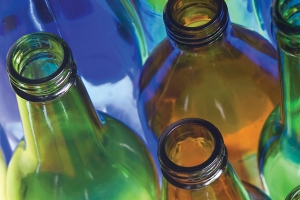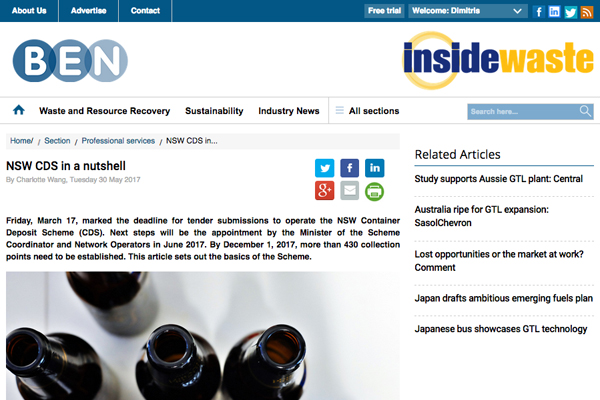NSW Container Deposit Scheme in a nutshell
By Charlotte Wang, MRA Consulting Group
Friday 17th March, marked the deadline for tender submissions to operate the NSW Container Deposit Scheme (CDS). Next steps will be the appointment by the Minister of the Scheme Coordinator and Network Operators in June 2017. By 1 December 2017, over 430 Collection Points need to be established. This article sets out the basics of the Scheme.
CDS structure
Starting on 1 December 2017, the CDS will introduce a 10c refund for eligible containers. These include glass, plastic, aluminium, liquid paperboard and steel cans. Manufacturers and retailers will increase the price of these goods to cover both the 10c rebate and a handling fee. The handling fee covers the administration fee and network fee for administrative and operating services provided by the Scheme Coordinator and Network Operators.
The role of Network Operators and the Scheme Coordinator
The Scheme will be run by a single Scheme Coordinator, appointed by the State through a currently underway competitive tender process. The Scheme Coordinator will be responsible for managing the Scheme finances and payments, particularly the payment of the refund amount, administrative fee and network fee by beverage suppliers to fund the operation of the Scheme. Furthermore, the Scheme Coordinator will be responsible for managing Scheme-wide data regarding container amounts, refund amounts and proof of recycling for those containers collected through the Scheme. The Scheme Coordinator will also be responsible for all educational or marketing activities.
 On the other hand, a different Network Operator will be appointed by the State for each of the seven ‘zones’ of NSW. Moreover, the zone encompassing Sydney, Newcastle and Wollongong will be divided between a maximum of three Network Operators. The same organisation may be appointed as Network Operator for multiple or all zones. Network Operators will be responsible for establishing Collection Points that need to comply requirements set by the State in regard to location, number of points, opening hour and payment method. Network Operators may own and operate all Collection Points, or may engage Collection Point Operators. These can be any business or organisation, and it is expected that some, from retailers to not-for-profits to councils, will choose to become Collection Point Operators. The Network Operators will also ensure containers are ultimately recycled.
On the other hand, a different Network Operator will be appointed by the State for each of the seven ‘zones’ of NSW. Moreover, the zone encompassing Sydney, Newcastle and Wollongong will be divided between a maximum of three Network Operators. The same organisation may be appointed as Network Operator for multiple or all zones. Network Operators will be responsible for establishing Collection Points that need to comply requirements set by the State in regard to location, number of points, opening hour and payment method. Network Operators may own and operate all Collection Points, or may engage Collection Point Operators. These can be any business or organisation, and it is expected that some, from retailers to not-for-profits to councils, will choose to become Collection Point Operators. The Network Operators will also ensure containers are ultimately recycled.
Table 1 – Summary of Scheme operator roles
| Network Operators | Scheme Coordinator |
Each of the 7 regional zones in NSW will have one Network Operator, with the exception of the Sydney Metro zone, which may have up to three Network Operators. The Network Operators’ roles are to:
|
NSW will have only one Scheme Coordinator. The Scheme Coordinator role is to:
|
Collection Points (CPs)
Unlike in other schemes we won’t be able to redeem our containers at the local 7 Eleven, Coles or Woolworths, we will need to present it at a Reverse Vending Machine or a larger scale Collection Point (CP).
MRA has reviewed major RVM technologies and while the typical ATM sized machine has some application, much larger machines are necessary. That implies that large banks of sorting machines will need to be installed in car parks or specially designed facilities to meet demand. The Department of Planning is processing an exemption for such ‘recycling infrastructure’ in order to fast track the establishment of Collection Points. The Amendment to the State Environmental Planning Policy (Exempt and Complying Development Codes) 2008 was on exhibition until the 26th April 2017.
To put your hand up for becoming a Collection Point, respond to any RFQs issued by organisations tendering for Network Operator roles (the organisations are listed on the NSW EPA website) or register your interest through the NSW EPA’s online form.
10c refunds for the public and Material Recovery Facility (MRF) Operators
Redemptions under the CDS can be classified into two groups, on the basis of the redeemer. These are the ‘public’ and Material Recovery Facilities (MRFs). In both instances, redeemers must be able to receive a 10c refund, per eligible container, when redeemed in the manner stipulated by the State.
 For the public, eligible containers must be brought to an EPA-approved Collection Point. CPs, bar a select few sites in Sydney, must collect all eligible containers (as opposed to a single material type). Furthermore, the public must be presented with the choice to redeem their containers for cash. However, vouchers and electronic cards are expected to be CPs’ preferred method of refunding containers, at the customer’s choice. Some CPs may also offer a donation model, in addition to a refund model, to present customers the choice of donating the proceeds of their refund to a charity or not-for-profit organisation.
For the public, eligible containers must be brought to an EPA-approved Collection Point. CPs, bar a select few sites in Sydney, must collect all eligible containers (as opposed to a single material type). Furthermore, the public must be presented with the choice to redeem their containers for cash. However, vouchers and electronic cards are expected to be CPs’ preferred method of refunding containers, at the customer’s choice. Some CPs may also offer a donation model, in addition to a refund model, to present customers the choice of donating the proceeds of their refund to a charity or not-for-profit organisation.
Installed CPs are likely to differ in infrastructure and type. For example, they may be manned by staff who count each container manually and dispense a cash refund via a cash register or may be fully automated. Fully automated CPs may ever offer customers the option to enter their details into a computer, print a tag to label their bag of containers, place the bag into a chute and receive their refund via bank transfer.
For MRFs, a Material Recovery Facility Processing Refund Protocol (“the Protocol”) will be published by the NSW EPA, in accordance with the Waste Avoidance and Resource Recovery Amendment (Container Deposit Scheme) Act 2016 and the Waste Avoidance and Resource Recovery (Container Deposit Scheme) Regulation 2017. The Protocol will:
- outline a method for MRFs to estimate the number of eligible containers processed per quarter;
- establish a process for MRFs to claim their refund; and
- establish a process for the Scheme Coordinator to verify MRF claims and dispense the refund.
At the time of writing, the Protocol is yet to be published by the NSW EPA.
Refund sharing between MRFs and Councils
Section 18 of the Waste Avoidance and Resource Recovery (Container Deposit Scheme) Regulation 2017 sets out arrangements for the distribution of refund amounts arising from kerbside recycling. The refund value must be shared between MRF operators and councils. MRFs will have 12 months from the 1st of December to negotiate a ‘refund sharing agreement’ with their council clients, to the satisfaction of the council. Without agreement of the council, onwards from the 1st anniversary of the Scheme, MRFs will not be able to claim a refund on kerbside-sourced eligible containers processed through their MRF. Alternatively, if a suitable agreement is already in place, councils should notify the EPA in writing of their satisfaction with existing agreements.
MRA expects negotiations between MRFs and councils to commence well before the 1st December. Both sides should undertake sampling and modelling of eligible container amounts, as well as the associated cost changes, existing and projected for post-December 1. The refund sharing arrangement may involve lowering the gate fee or introducing a rebate on commingled containers. MRFs and councils should consider seeking the independent advice of an expert during their negotiations.
For further information, please contact MRA at info@mraconsulting.com.au. As always, we welcome your feedback on this, or any other topic, on ‘The Tipping Point’.
This article has been published by the following media outlets:




